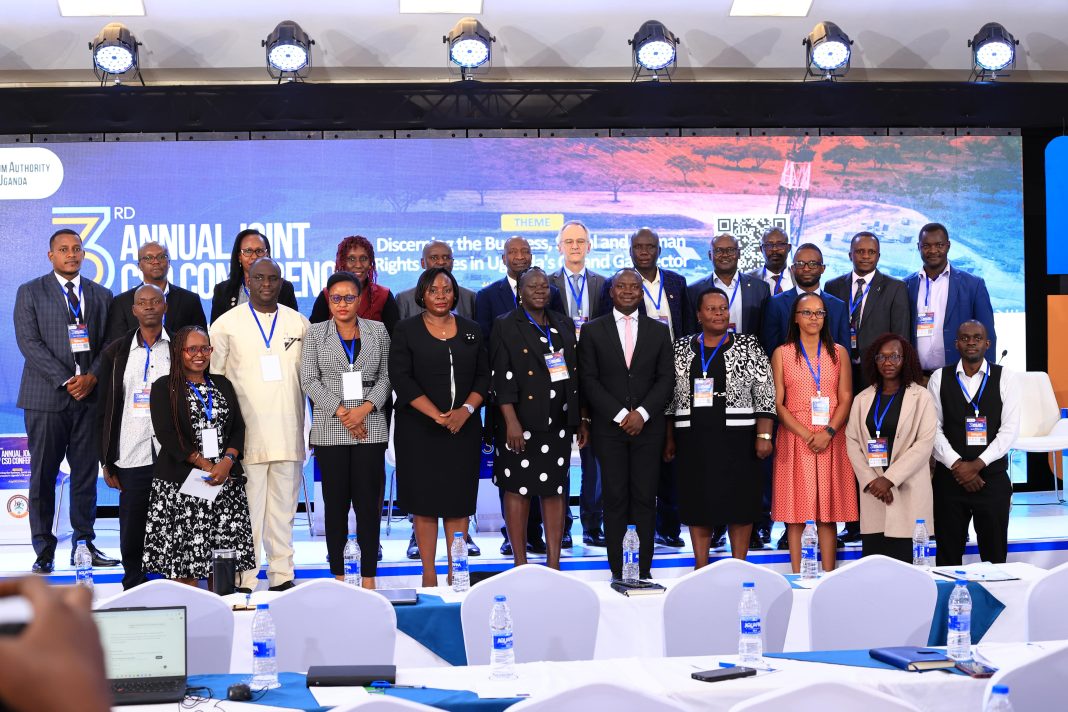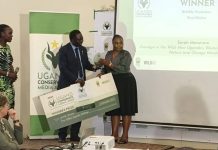Key stakeholders from civil society, government, and the oil and gas sector have pledged to deepen cooperation and foster mutual understanding in a renewed effort to advance best practice in business and human rights in Uganda’s extractive industry. This commitment was reaffirmed during the 3rd Civil Society Organisation (CSO) Conference on Oil and Gas, organised by the Petroleum Authority of Uganda (PAU) in partnership with various actors. The annual event continues to serve as a vital platform for dialogue, transparency, and trust-building across the sector.
Mr. Ernest Rubondo, Executive Director of the Petroleum Authority of Uganda (PAU), emphasised the importance of open dialogue in his opening remarks. “We’ve made significant progress thanks to stakeholder alignment across most activities. However, differences have emerged—particularly around business, social, and human rights perspectives. It’s crucial that even in disagreement, we foster constructive engagement that promotes learning without hindering Uganda’s socio-economic development,” Mr. Rubondo said.
He further acknowledged the work undertaken by civil society actors in supporting information sharing, community empowerment, policy enhancement, and adherence to international best practices, especially in areas related to social inclusion and human rights.
Mr. Frank Mugisha, Ag. Commissioner for the Petroleum Department at the Ministry of Energy and Mineral Development (MEMD), speaking on behalf of the Minister, reaffirmed the government’s dedication to upholding human rights throughout Uganda’s oil and gas journey.
“As we advance in resource extraction, human rights, environmental sustainability, and equitable benefit sharing are non-negotiable. Our development strategy must integrate social safeguards, uphold dignity, and promote justice, especially for communities in project areas,” Mr. Mugisha noted.
He also commended the Civil Society Coalition on Oil and Gas (CSCO) for its consistent engagement in public education, policy advocacy, and sector monitoring.
The keynote address by Ms. Ana Maria Esteves, founder of Community Insights Group and Honorary Professor at both the Australian National University and the University of Strathclyde, delivered a compelling call to action on the centrality of social and human rights performance in business—particularly for marginalized and often overlooked communities.
She highlighted the critical yet underappreciated role of Community Liaison Officers (CLOs), who operate on the frontlines of extractive projects, managing complex power dynamics and the competing expectations of companies and communities.
“True human rights due diligence means seeing and supporting everyone, especially those often overlooked. Community Liaison Officers are at the frontline, navigating complex power dynamics and expectations. Their voices, and the communities they represent, must be central to our performance and progress,” emphasised Ms. Esteves.
TotalEnergies’ General Manager, Mr. Philippe Groueix, emphasized that respect for each other is one of the core values that guides their approach to dialogue and human rights as they undertake the Tilenga Project. He underscored the company’s tangible impact through its agricultural programs, which have improved livelihoods for over 11,000 people within the project area by enhancing food production, and increasing access to education, healthcare, and markets.
“At TotalEnergies, we remain committed to a culture of active listening, learning and continuous improvement. We are not here to meet minimum standards – but to strive to set new benchmarks in the responsible energy development of the Tilenga Project,” said Mr. Groueix.
Speaking on behalf of civil society under the Civil Society Coalition on Oil and Gas (CSCO), Mr. Bashir Twesigye emphasized that the engagement came at a pivotal moment, particularly as protests against the East African Crude Oil Pipeline (EACOP) have resurfaced.
“It is important to spotlight emerging issues, and as CSCO, we believe the contributions of broader civil society actors must be recognized. Their role in shaping dialogue and ensuring accountability is vital, and we call for deeper, continued engagement,” Mr. Twesigye stated.
However, Mr. John Bosco Habomugisha, Deputy Managing Director of EACOP, cautioned that some youths were being misled into protests by misinformation. He reaffirmed EACOP’s commitment to transparency and engagement.
“We value the role of civil society in promoting accountability and compliance. EACOP is committed to strengthening collaboration—on worker rights, grievance mechanisms, gender-responsive policies, and Business and Human Rights awareness—especially amid growing public concern and youth activism.”
CNOOC Uganda’s Corporate Social Responsibility (CSR) Manager, Mr. Zak Lubega, presented updates on the Kingfisher project, spotlighting community engagement strategies and a dedicated human rights management plan. “Daily interactions with local communities and the work of Community Liaison Officers (CLOs) ensure concerns are addressed and stakeholder interests are respected,” he said.
The conference also featured insights from Ms. Christine Byaruhanga, Head of Legal and Human Rights at TotalEnergies, who presented the company’s robust human rights framework aligned with international standards and the United Nations Guiding Principles on Business and Human Rights.
Ms. Ruth Ssekandi, Director of Inspections at United Nations High Commissioner for Refugees (UNHCR), shared real-life challenges encountered during oil and gas operations, from noise complaints to infrastructure strain, reinforcing the need for continuous monitoring and stronger civil society involvement.
Looking ahead, Hon. Ruth Nankabirwa, the Minister of Energy and Mineral Development, in a statement delivered on her behalf, committed to institutionalising a multi-stakeholder Human Rights and Extractives Forum, supporting local government and community capacity-building, and encouraging licensees to operationalise human rights due diligence frameworks.
As Uganda moves towards first oil, such multi-stakeholder engagements reaffirm the country’s commitment to ensuring that oil and gas development uplifts rather than undermines the rights and welfare of its people.























